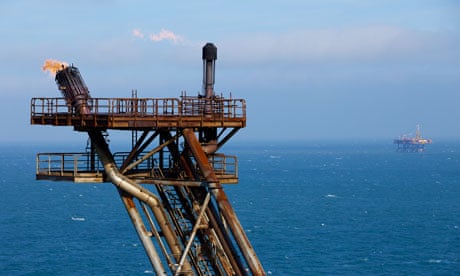The dispute between energy firms and the government over the level of tax paid for offshore UK drilling dramatically escalated on Sunday with British Gas threatening to shut down an important gas field on the Irish Sea.
Centrica, which owns British Gas, closed the Morecambe Bay field for routine maintenance and warned it may not reopen it because of the 12% tax rise on offshore drilling profits that was announced by the chancellor, George Osborne, in the budget in March.
The move provoked an immediate response from the Treasury, which said the rise was necessary and that the company would continue to make substantial profits on its operation.
Morecambe Bay produces 6% of the UK's gas, but Centrica said it may now be cheaper to buy supplies on the open market, shipping them in from abroad, rather than bear the expense of operating Morecambe where gas is subject to an "onerous" tax regime.
Centrica said that UK oil and gas fields are now subject to the highest levels of tax in the world. A spokesman said: "At these higher tax rates, Morecambe's profitability can be marginal. Accordingly, we may choose to buy gas for our customers in the wholesale markets in preference to restarting the field after planned maintenance [due to last four weeks]."
The company added that following the increase in supplementary corporation tax, North Morecambe will be subject to a 62% tax rate and South Morecambe 81%.
"This impacts the trigger levels at which point we shut in production and purchase gas from other sources such as LNG [liquefied natural gas]."
A Treasury spokesman said the tax rise was essential to help motorists cope with the soaring cost of petrol: "The decision to increase the charge on oil and gas companies ... has allowed the government to lower fuel duty, helping hard-pressed motorists at a difficult time. Even with this change, average post-tax oil profits per barrel are forecast to be higher in the next five years than the last five, meaning that profits are expected to stay high."
In February, Centrica reported record profits of £742m at British Gas – a 24% leap on a year earlier – provoking criticism from consumer groups. Centrica had pushed through a 7% increase in energy bills just two months earlier.
Centrica argues that its gas production goes into power stations, not to fuel cars, and that it should not have to pay a tax being levied to help motorists.
The row between business and government is potentially embarrassing for Centrica as its chief executive, Sam Laidlaw, has recently been appointed a non-executive director at the Department for Transport as part of the drive to import private-sector efficiency to Whitehall.
The chancellor sparked uproar in the energy industry when he imposed the £2bn windfall tax on North Sea firms. The industry was furious that the levy was introduced without consultation and warned it could jeopardise investment, damage investor confidence and hit jobs. Last week, Shell and BP both reported big increases in profits but said the tax increases could cost them as much as $1bn (£600m) each. Some companies have threatened an investment boycott in response to the new tax, which follows increases introduced a few years ago when Gordon Brown was chancellor.
Executives argue they need "fiscal certainty" if they are to continue to invest in the North Sea, where production is in decline but thousands of British workers are still employed. They have been lobbying hard to change the chancellor's mind, but so far he has refused to reconsider.
Critics have complained that the energy industry is trying to dodge its responsibilities and avoid paying a fair share of higher taxes at a time of national economic hardship. Unions and consumer groups point out that oil prices have been soaring, thanks to the boom in commodity prices generated by bigger demand from India and China.
Last week, the AA said it planned to ask the European competition commission to investigate whether oil and petrol markets are being manipulated after Shell reported first-quarter profits up 40%, which means the company is making £2m an hour.
In the past, Treasury ministers have dismissed fears that the hike in North Sea taxes would lead to a decline in production. But oil executives have threatened to bring forward the retirement of many big fields, shutting down infrastructure that could affect smaller developers struggling to bring new oil fields into production.
Thousands of jobs in Scotland have been put at risk after Norway's Statoil said it would "pause and reflect" before starting on a £3bn project near the Shetlands.
Oil companies have complained that Osborne's decision would scupper plans to explore the remaining North Sea fields, a move which was expected to create 15,000 jobs.
